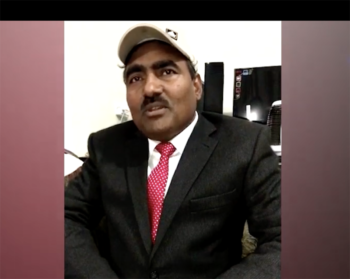A Korean Christian and three nationals of India are in jail in Uttar Pradesh state, accused of

fraudulent conversion attempts while distributing food and other aid to people in need due to COVID-19 lockdown, sources said.
Under a new “anti-conversion” law that went into effect in Uttar Pradesh state, India on Nov. 28, police arrested 50-year-old Mi Kyung Lee of Seoul, South Korea and the three others on Dec. 19 in Greater Noida, Gautam Buddh Nagar District, said the aid organizer, Raj Kumar Masih.

Masih has organized relief aid to thousands of people since obtaining permission from the Additional District Magistrate on March 23, setting up distribution centers in various areas and at his church site, he said. Among the beneficiaries were Anita Sharma and Muksi Gupta.
As Gupta knew who needed aid in her neighborhood, Masih sent two Indian nationals and their driver to her home to prepare a list of people to receive aid, with Lee accompanying them as she needed a lift to reach another location, Masih said. Gupta’s next-door neighbor, Sharma, saw the four people leaving Gupta’s house and reported to police that they had previously offered money to her and Gupta to convert to Christianity, Masih said.
Saying that not all of the four people arrested are even Christian, Masih denied that they offered anyone money to convert.
“We have proofs of our distribution and names and phone numbers of our beneficiaries, who can testify that we have not asked any of them to change their faith or religion,” Masih told Morning Star News. “All beneficiaries were distributed ration kits, but none were promised any kind of money.”
In her police complaint, Sharma alleged that the four had approached her and Gupta during lockdown and invited them to a Malakpur church to receive the free rations offered due to the pandemic. Thereafter, Sharma alleged, the four people began visiting their homes on Saturdays and Sundays, promising them money if they converted.
Sharma accused the four people of offering her and Gupta more rations if they removed pictures of Hindu idols from their homes and promising them 1 million rupees (US$13,673) each if they converted to Christianity. She received 7,000 rupees (US$95) and a month’s ration, and Gupta received 3,000 rupees (US$41) and a two-month ration, according to her complaint.
Lee, a friend of Masih, was visiting India when the onset of the pandemic obligated her to remain in the country, where she stayed with Korean friends. The other three suspects arrested were Umesh Kumar, the 30-year-old driver, and two women helping with the distribution, identified only as 25-year-old Seema, and 24-year-old Sandhya, who like Kumar is not Christian, Masih said.
“Seema visited Muksi Gupta’s house to collect the names of the beneficiaries who would be given the relief,” Masih said. “Muksi knows the people in her area well. The driver had taken Seema there, and Sandhya had accompanied her. It hardly took them five-seven minutes while Seema prepared the list, and when they left Gupta’s home to leave, Anita Sharma the adjacent-door neighbor was watching all of this.”
Based on Sharma’s complaint, Surajpur police arrested the four people and registered the district’s first case of the state’s newly enacted Prohibition of Unlawful Religious Conversion Ordinance, aimed at checking illegal religious conversions.
Station Head Officer Pradeep Kumar Tripathi said police registered First Information Report (FIR) No. 0998, charging the four suspects with “deliberate and malicious acts intended to outrage religious feelings of any class by insulting its religion or religious beliefs” under the Indian Penal Code. They are also charged under Section 3/5(1) of the newly enacted Uttar Pradesh law of “unlawful conversion from one religion to another by misrepresentation, force, undue influence, coercion, allurement or by any fraudulent means or by marriage.”
The four suspects appeared in court on Dec. 20 and were sent to jail, and police confiscated the vehicle they were using, which belongs to Masih.
Saying the FIR was completely fabricated, Masih called the arrests a well-planned conspiracy of the Hindu nationalists.
“Nobody even bothered to ask the arrested their side of the story,” Masih told Morning Star News. “What is shocking is that the driver, Umesh Kumar, and Sandhya are not even Christians. The local media have falsely reported them all to be Christians.”
Sub-Inspector Ram Chandra Singh said the driver and the other two local suspects had all converted to Christianity long ago.
“I have done complete investigation, and it is all true,” Singh told Morning Star News.
After the arrests, Hindu nationalist groups praised local police. The district branch of the Hindu extremist Vishwa Hindu Parishad (World Council of Hindus), along with a radical Hindu group known as the Karni Sena (Karni Army) and others visited and praised the station house officer and his team at the Surajpur police station on Dec. 21.
As of Dec. 28, police in Uttar Pradesh had registered 14 cases under the new law and made 51 arrests, of whom 49 were in jail. Of these, the alleged target of fraudulent conversion has filed a complaint in only two cases; the rest of the cases were filed by others, such as relatives.
The case in Noida, Gautam Buddh Nagar District, was the first case in Uttar Pradesh where Christians were accused. A second case happened the next day in Azamgarh, where three Christian men were arrested and sent to jail.
‘Anti-Conversion’ Law
Uttar Pradesh is the eighth state in India to enforce an anti-conversion law, commonly known as “freedom of religion” acts. Anti-conversion laws are in force in the states of Odisha, Madhya Pradesh, Chhattisgarh, Gujarat, Himachal Pradesh, Jharkhand and Uttarakhand. The states of Arunachal Pradesh and Rajasthan have passed anti-conversion laws that are not in force for various reasons, and Tamil Nadu has passed and repealed its anti-conversion law.
The law was deemed necessary in Uttar Pradesh to counter so-called “Love Jihad,” whereby Muslim men target Hindu women for marriage in order to convert them and reduce the number of Hindus in India. Madhya Pradesh and Haryana states have also declared intentions to enforce similar laws, with the Madhya Pradesh cabinet passing an ordinance on Dec. 26.
Uttar Pradesh’s law, with prison terms of up to 10 years, lays the burden of proof on the person accused of having caused or facilitated fraudulent conversion.
The new law also requires those seeking to convert and those performing conversion ceremonies to submit intention to do so in advance to the district magistrate. Those seeking to change their religion must submit the declaration no less than 60 days in advance, while the person performing the ceremony is required to give a 30-day notice.
Violation of this section calls for imprisonment of six months to three years for the one converting and one to five years for the one performing the ceremony. Conviction would also make the conversion invalid and illegal under the law.
After receiving both declarations, the district magistrate must investigate the conversion to determine its intention, purpose and cause.
After conversion, within 60 days the convert must send a declaration on a prescribed form to the district magistrate, who will publicly display it on a notice board of his office. The declaration contains the convert’s name, father’s name, husband’s name in the case of a married female convert, permanent address, present address, new and former religion, date and place of conversion, and the nature of the process for conversion.
Converts must appear before the district magistrate to verify their identity within 21 days of sending the declaration and confirm its contents. Violating these procedures will make the conversion illegal and void, under the law.
If a marriage takes place solely for the purpose of unlawful conversion or vice-versa, it would be declared void.
Fraudulent conversions of two or more persons are punishable by three to 10 years of prison and a fine of 50,000 rupees (US$684) or more. Fraudulent conversion of a minor, woman, or person belonging to a Scheduled Caste or Scheduled Tribe is punishable by two to 10 years in prison and a fine of 25,000 rupees (US$342) or more. Any other fraudulent conversion carries a prison term of one to five years and a fine of 15,000 rupees (US$205) or more.
Under the law, each repeat conviction will attract double the punishment specified for the respective offense. All offenses under the law are non-bailable.
India ranked 10th on Christian support organization Open Doors’ 2020 World Watch List of the countries where it is most difficult to be a Christian. The country was 31st in 2013, but its position has been worse each year since Narendra Modi of the Bharatiya Janata Party came to power in 2014.– Morning Star News
If you would like to help persecuted Christians, visit http://morningstarnews.org/resources/aid-agencies/ for a list of organizations that can orient you on how to get involved.
If you or your organization would like to help enable Morning Star News to continue raising awareness of persecuted Christians worldwide with original-content reporting, please consider collaborating at https://morningstarnews.org/donate/?



